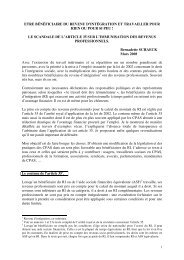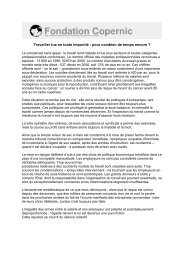Awra Amba RJ 300612 EN - Contacter un comité local d'Attac
Awra Amba RJ 300612 EN - Contacter un comité local d'Attac
Awra Amba RJ 300612 EN - Contacter un comité local d'Attac
Create successful ePaper yourself
Turn your PDF publications into a flip-book with our unique Google optimized e-Paper software.
77 / 85<br />
Conclusion<br />
limits strongly the arrival of new members in agreement with its values, and its culture widely<br />
opposed to the values of neighbouring comm<strong>un</strong>ities, what prevents or limits strongly the arrival of<br />
new members little convinced by the approach. A solution would be to expand somewhere else, but<br />
the success is not guaranteed.<br />
Withdrawal, lack of openness to the world<br />
In our opinion, the connection of <strong>Awra</strong> <strong>Amba</strong> with other societies is problematic. The comm<strong>un</strong>ity<br />
was built aro<strong>un</strong>d a true spiritual leader in conflict with the traditional Amhara society. It fo<strong>un</strong>d most<br />
of its cultural and ideological corpus from within – and firstly from its leader. Its immersion in a<br />
nearby environment at the other end of the spectrum of values and very aggressive, at least at its<br />
beginning, has the consequence it inherits a situation of violent conflict with its nearby neighbours; it<br />
is therefore nor open to these comm<strong>un</strong>ities, neither inclined to influence them.<br />
The situation is different with the rest of the Amhara region, <strong>Awra</strong> <strong>Amba</strong> attempts to influence by<br />
advertising as far as possible its experiment, with the help of many authorities. However, the<br />
connection seems one-to-one: it appears nowhere in the studies on <strong>Awra</strong> <strong>Amba</strong> that this comm<strong>un</strong>ity<br />
tries to learn from Ethiopian experiments. The lack of interest for the knowledge in the human and<br />
social sciences as for the Ethiopian literature strengthens this impression. It seems even clearer as<br />
regards foreign co<strong>un</strong>tries: if Zumra wishes to spread his message all over the world, he is apparently<br />
not waiting for anything from foreign experiments, except for technological inputs and material<br />
supports.<br />
The initial antagonistic situation and the wealth of its creativity could convince the comm<strong>un</strong>ity that<br />
there is nothing positive to be gained from the outside world in the social or human field.<br />
Relationships with the neighbours are <strong>un</strong>derstandable, but the lack of interest in the possible inputs<br />
from more distant societies indicates a poor intellectual openness and a withdrawal. It prevents the<br />
comm<strong>un</strong>ity from benefiting of the knowledge accumulated elsewhere and potentially useful for it.<br />
But <strong>Awra</strong> <strong>Amba</strong> is part of Ethiopia and belongs to today's world, and is therefore submitted to its<br />
ideological influences. It succeeded till now in resisting these influences through its own strengths.<br />
Will it be the same tomorrow? In our opinion, <strong>Awra</strong> <strong>Amba</strong> would benefit from getting closer to<br />
social and political movements, which share the same ideals and the same values worldwide, and<br />
from being aware of their analyses. It should make their culture stronger in order to resist to the<br />
adverse influences. If the comm<strong>un</strong>ity fo<strong>un</strong>ders have been able to analyse the traditional Amhara<br />
society, they know perfectly, we don't see how, alone, they can <strong>un</strong>derstand the world dominant<br />
consumerist and neoliberal culture, which crushed many a priori so<strong>un</strong>d cultures in the world. We<br />
doubt the <strong>Awra</strong> <strong>Amba</strong> comm<strong>un</strong>ity can acquire by its own, spontaneously, all the tools needed to<br />
<strong>un</strong>derstand and then fight opponents they do not know, or its culture is strong enough to oppose<br />
them.<br />
The emphasis given to education and the high number of yo<strong>un</strong>g people with a high-quality training,<br />
including through <strong>un</strong>iversity, should further this intellectual openness to the world.<br />
Heterogeneity<br />
The <strong>Awra</strong> <strong>Amba</strong> comm<strong>un</strong>ity is very <strong>un</strong>ited through the geographical proximity of its members, a<br />
common past, and shared values. Moreover, over time, the two first elements – proximity and past –<br />
will loosen: on the one hand, the number increase will transform a small comm<strong>un</strong>ity of aro<strong>un</strong>d a<br />
h<strong>un</strong>dred adults, where everyone knows everyone, into a larger group more widely dispersed<br />
geographically; on the other hand, the consciousness of having shared great hardships – in the last<br />
quarter of the 20 th century – will fade slowly with the renewal of generations. Some elements<br />
important for the cohesion of the group will therefore disappear, at least partially, leading to the<br />
group weakening.<br />
In addition, most of the today's <strong>Awra</strong> <strong>Amba</strong> members have chosen to live here, because they agree

















